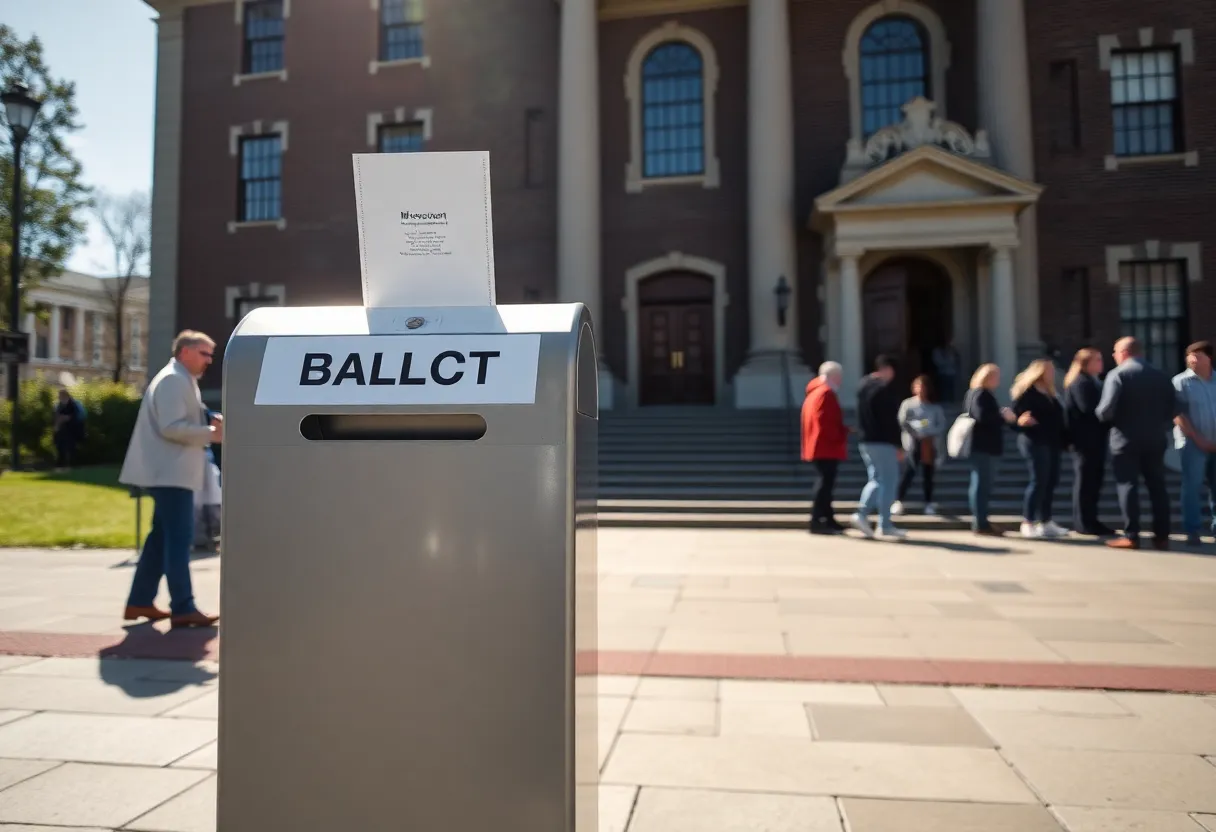Massachusetts, August 24, 2025
News Summary
Massachusetts Secretary of the Commonwealth Bill Galvin has defended the state’s mail-in voting system, emphasizing its security and the high level of public use. His comments come in response to former President Trump’s calls for eliminating mail-in voting nationwide. With over one-third of voters opting for mail-in ballots in recent general elections, Galvin highlights the rarity of voter fraud and the state’s effective safeguards as key points in the ongoing debate about the future of mail-in voting.
Boston — Massachusetts Secretary of the Commonwealth Bill Galvin defended the state’s mail-in voting system on grounds of security and broad public use, responding to renewed calls from former President Donald Trump to eliminate the practice nationwide. Galvin’s remarks come after recent national criticism and political debate over mail-in ballots and follow several years of steady use in Massachusetts.
Key points
Widespread use: More than one-third of Massachusetts voters cast ballots by mail in both the 2022 and 2024 general elections, making mail-in voting a common method in the state. Nationally, 29 percent of voters used mail-in ballots in the 2024 general election.
Partisan differences in use: In the 2024 election nationally, 37 percent of Democrats voted by mail compared with 24 percent of Republicans. In Massachusetts, 49 percent of registered Democrats voted by mail in 2024 while 17 percent of registered Republicans did the same. Despite those differences, many Republican voters also use mail options; 43.5 percent of voters participated by mail or early in the 2024 Massachusetts Republican state primary.
Political challenge from former President: The debate has been intensified by criticism from former President Trump, who voted by mail in Florida in 2020 and has since labeled mail-in voting as fraudulent on social media. His campaign against mail-in voting is framed by critics as political and based on assertions that are not supported by the available evidence.
Security and evidence about fraud
Fraud is rare: Multiple reviews and studies indicate that voter fraud, including problems involving mail-in ballots, is uncommon. A review found only 372 possible fraud cases out of 14.6 million mail-in ballots cast across three states in the 2020 election. High-profile incidents have occurred, including a few in Massachusetts, but experts and election officials describe these as isolated.
State safeguards: Massachusetts uses several procedural safeguards for mail-in ballots, including signature verification and online ballot tracking, designed to detect and prevent improper voting. The Secretary of the Commonwealth noted that competitive elections create incentives for candidates and parties to watch for irregularities.
Legal and constitutional context
State authority over elections: Under the U.S. Constitution, states have primary authority to set the time, place, and manner of elections, meaning a former president does not have unilateral authority to end mail-in voting nationwide. Any major change would require state-level action or federal legislation consistent with constitutional limits.
Massachusetts law: Massachusetts adopted permanent statewide mail-in voting options after 2020 and codified the system in the 2022 VOTES Act. That law made mail-in voting a permanent option for residents, and the system operated through the 2024 elections without widespread disruption according to state officials.
Possible changes and political outlook
2026 ballot proposal: Massachusetts is considering a proposal for the 2026 ballot that would limit mail-in voting to selected circumstances. The proposal reflects an ongoing debate about the scope of mail-in options, but any change would come through the state’s legislative or ballot processes, not by federal executive action.
Political drivers: Analysts note that opposition to mail-in voting has a political element: because Democrats disproportionately use mail-in ballots, some political actors have focused efforts on rollback. Still, mail-in voting draws voters across party lines, and state officials emphasize security measures and routine oversight.
What officials and studies say
State officials emphasize the combination of procedural checks and public transparency—such as online tracking of ballots and signature verification—as the basis for maintaining public confidence. Independent reviews find that fraud is rare in both mail-in and in-person voting, and high-profile prosecutions represent a tiny fraction of the millions of ballots cast in recent elections.
Bottom line
Massachusetts continues to treat mail-in voting as a secure, widely used option that is legally grounded under state law. National criticism, including calls to eliminate mail voting, faces both legal limits and substantial evidence that cases of mail-ballot fraud are uncommon. Any major policy changes would need to proceed through the state or federal legislative and judicial processes.
Frequently Asked Questions
Is mail-in voting common in Massachusetts?
Yes. Over one-third of Massachusetts voters used mail-in ballots in both the 2022 and 2024 general elections, and mail voting has been a permanent option in the state since the 2022 VOTES Act.
How common is mail-in voting nationwide?
In the 2024 general election, 29 percent of voters nationwide cast ballots by mail. Usage varies by state and by party affiliation.
Does mail-in voting increase the risk of fraud?
Available studies and reviews indicate that voter fraud is rare for both mail-in and in-person voting. For example, a review identified 372 possible mail-in fraud cases out of 14.6 million mail ballots cast in three states in 2020.
What safeguards does Massachusetts use for mail-in ballots?
Massachusetts uses signature verification, online ballot tracking, and other procedural checks to confirm identity and monitor ballot status. State elections officials and competitive incentives for campaigns also help detect irregularities.
Can the President eliminate mail-in voting nationwide?
No. The U.S. Constitution leaves states responsible for setting the time, place, and manner of elections, so eliminating mail-in voting across all states would require state-level action or federal legislation within constitutional limits.
Quick reference table
| Topic | Key facts | What voters should know |
|---|---|---|
| Massachusetts mail-in use | Over one-third of voters used mail-in ballots in 2022 and 2024; permanent since 2022 VOTES Act. | Mail-in voting remains an established, legal option in Massachusetts. |
| National mail-in use (2024) | 29% of voters cast ballots by mail in the 2024 general election. | Usage varies widely by state and party affiliation. |
| Fraud incidence | Studies show fraud is rare; review found 372 possible cases out of 14.6 million mail ballots in three states (2020). | High-profile cases are isolated and not indicative of widespread fraud. |
| Safeguards in Massachusetts | Signature checks, online ballot tracking, and other verification measures. | These measures are meant to detect and prevent improper ballots. |
| Legal authority | States control election procedures under the Constitution; federal executive action cannot unilaterally end state mail voting. | Changes would require state legislative or ballot action, or federal law subject to constitutional limits. |
Deeper Dive: News & Info About This Topic
HERE Resources
Lawrence City Councilor Pleads Guilty to Voter Fraud Charges
Boston Elections Department Faces Ballot Error Ahead of Elections
Additional Resources
- Boston Globe: Mail-In Voting and Trump
- Wikipedia: Voting by Mail
- Boston.com: Galvin Rejects Trump’s Pledge
- Google Search: Mail-in Voting 2025
- Patch: Trump Vows to End Mail Ballots
- Encyclopedia Britannica: Voting
- WBSM: Trump Mail-In Voting Ban
- Google News: Mail-in Voting Massachusetts
- Boston Herald: Election Transparency Group

Author: STAFF HERE BOSTON WRITER
The BOSTON STAFF WRITER represents the experienced team at HEREBoston.com, your go-to source for actionable local news and information in Boston, Suffolk County, and beyond. Specializing in "news you can use," we cover essential topics like product reviews for personal and business needs, local business directories, politics, real estate trends, neighborhood insights, and state news affecting the area—with deep expertise drawn from years of dedicated reporting and strong community input, including local press releases and business updates. We deliver top reporting on high-value events such as Boston Marathon, Head of the Charles Regatta, and Boston Harborfest. Our coverage extends to key organizations like the Greater Boston Chamber of Commerce and Associated Industries of Massachusetts, plus leading businesses in finance, biotech, and insurance that power the local economy such as Fidelity Investments, Biogen, and Liberty Mutual Insurance. As part of the broader HERE network, we provide comprehensive, credible insights into Massachusetts's dynamic landscape.



